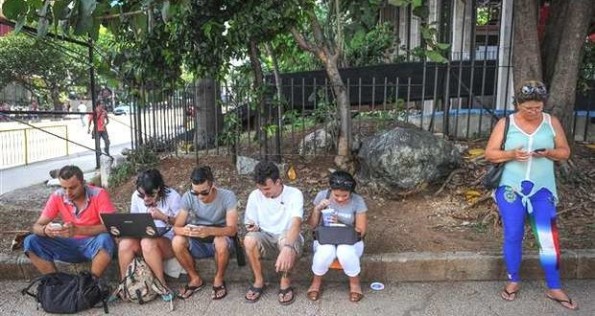Ivan Garcia, 30 July 2015 — Browsing the internet outdoors in 90 degree heat could be classified as an extreme sport. If you stroll through downtown 23rd Street in the Havana district known as La Rampa, you will observe about a hundred adolescents and adults clustered under a covered walkway, in a stairway or on a low wall updating their Facebook pages or reading a notice in a Florida newspaper.
The introduction of the internet in Cuba was accompanied with absurd prices. The state telecommunications monopoly, ETECSA, is like a dinosaur trying to cross a suspension bridge while swing dancing.
To speak of its incompetence, bureaucracy and poor service is to be redundant. I advise those who are angry, high-strung or violent to avoid doing business with one of the company’s offices.
After two hours waiting in line, putting up with the rudeness of its employees and paying a king’s ransom for internet service, you begin to see sense how one could become a serial killer.
On any given day an unbalanced person with a machete, angered by the sluggish pace, might take things out on the exasperating executives, managers and drones of a company that has succeeded in making ineptitude a way of life.
At least that is how it seemed to me when, at noon on an intolerably hot day, an out-of-control customer could not take it anymore. Striding in with loose cables and in full crisis mode — a bit like Clint Eastwood’s vengeful gunslinger, William Munny, drinking a shot of whiskey before riding into town — he began cursing at a female employee, who nervously ran to call a security guard.
The guy had his reasons. His account had a balance of 70 CUC. But when he tried to use the wireless network at 23rd Street from his tablet, an error message informed him he did not have the money to access the service.
“The apathy and sloppiness of ETECSA is astounding. Every month I have to come in and wait in line for an hour to clean up the email inbox on my cell phone. I don’t know why the company doesn’t find a technical solution to this problem,” said Rosario, who was sympathetic to the man with smoke coming out of his ears.
The minister of communications, a guy with the rather odd name of Maimir Mesa, boasted of the government’s intention to computerize Cuban society. Without a hint of embarrassment, he described in almost poetic terms recent price cuts for internet access. While previously Cubans had to spend 112 CUC a month just to get online, the kind-hearted state would now lower the price to a mere 50 CUC.
The problem is that no Cuban worker makes more than two CUC a day. The average monthly salary is 23 CUC. To access the internet for one hour a day, a person would need 60 CUC. But a Cuban’s passivity is enormous.
And so here we are, on a sidewalk at 23rd Street, surfing the internet under an unrelenting sun, uploading photos to Facebook and “sugar-coating the pill” destined for a relative in Miami or a foreign friend in order to ask for money, an Apple ipad or Nike sneakers.
Heberto, an entrepreneur, discusses how he and a friend, who lives in La Rampa, decided to open a cybercafe together. “The idea was to sell food and cold beverages,” he says. “We were going to buy half a dozen computers but we needed ETECSA to set up the internet and wifi. When we approached a company director about it, he told us they were not authorized to provide this service to private businesses. In reality private-sector workers are just a calling card the government uses to sell the illusion of openness to the outside world.”
At Havana’s state-run cafes, the ones that only accept hard currency, access to wireless networks is not available. At the one on the ground floor of the Miramar Trade Center, the manager asked ETECSA to remove the wifi because, according to a waitress there, “a bunch of users sat down to browse the internet but only one bought a soda.”
Cubans’ patience and resignation know no bounds. Even having to pay astronomical prices does not move us to demand our rights.
It would not surprise me if in 2059 a million Havana residents gathered in the Plaza of the Revolution to celebrate the centenary of Fidel Castro’s rise to power. I hope to be dead by then.
Iván García
Photo: These users were smart. They took advantange of a sliver of shade under a tree outside the Cuba Pavilion in La Rampa. At that time of day the sun is not as punishing on that side of 23rd Street, one of the most centrally located thoroughfares in Havana. From Daily News.

